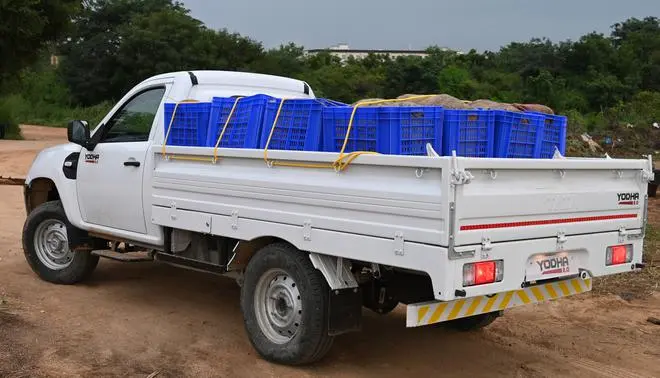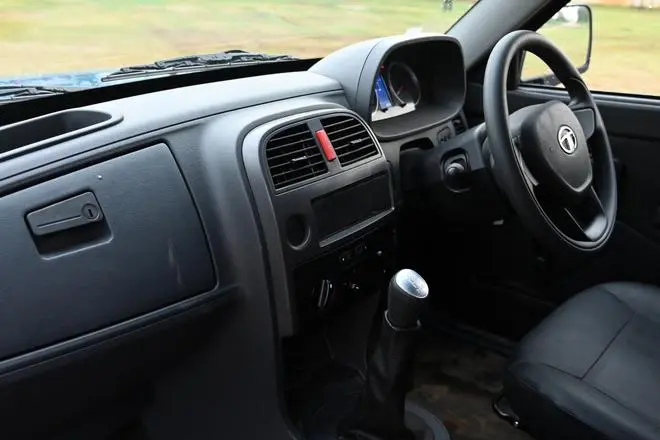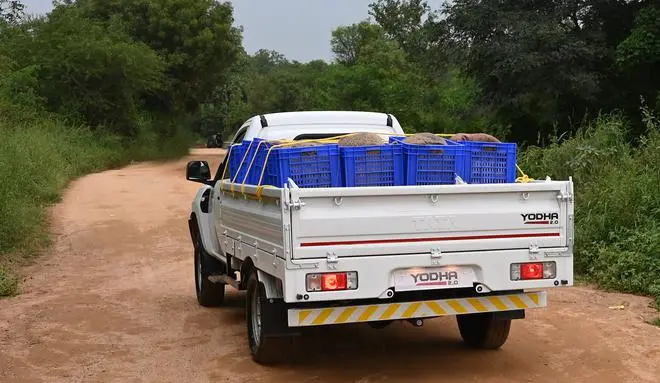The commercial vehicle segment of the automobile industry in India has traditionally witnessed evolutionary steps only in small increments. Not anymore, as competition intensifies, the consumer matures and the big global players make further inroads, the CV industry is also set to change dramatically.
Sitting at the cusp between passenger vehicles and CVs, pick-up trucks as a category are likely to see the most changes, including accelerated adoption, in the next few years. As a brand that has straddled the CV space spanning multiple categories, Tata Motors has had its own development cycles. Unlike the more glamorous and hyper-competitive passenger vehicle segment, the generation life cycles for CVs are longer on average. But this too will change soon.
After launching the Xenon that was focused on individual buyers, Tata Motors has been focusing largely on the SCV (small commercial vehicles) category that has institutional buyers as the target audience. This is where the action has been heating up over the last few months, with companies like Mahindra, Ashok Leyland, and Tata slugging it out to capture more of the market. Factors driving the rapid rise in sales include e-commerce logistics providers; brick and mortar retail switching over to smaller transporters; and the whole hub and spoke model becoming more popular amongst logistics players.
Tata Motors recently launched the new Intra V50 and Yodha 2.0 pickup trucks. These are meant for institutional buyers and entrepreneurs, not so much for individual buyers attempting to make a lifestyle statement. But, the spotlight is on the evolution of the genre, and that is why when Tata Motors asked me if I would like to take a fully loaded Yodha 2.0 on an outing, my curiosity was piqued.
To prove the new Yodha’s prowess with an on-road and off-road test, Tata Motors officials had set up a closed course on a private property near Hyderabad airport. And to make it even more authentic, the test mule, Yodha 2.0’s deck was stacked with cement bags weighing precisely two tonnes!
Rugged Design

The chassis has been further reinforced and it now boasts of having the highest rated payload capacity of 2,000 kg | Photo Credit: BIJOY GHOSH
Pickup trucks serve as the key intermediate segment in the CV business, enabling nimbler, more compact-sized vehicles to transport goods on narrow urban streets. Merging the attributes of a SUV and that of a truck, Pickups bring the benefits of the comfort and practicality of an SUV for the user, while they can also serve as hardcore payload carriers.
The Yodha 2.0 pickup gets changes that make it more aspirational, while delivering on its key attribute of being a robust workhorse. The chassis has been further reinforced and it now boasts of having the highest rated payload capacity of 2,000 kg. The external load body, or load deck, in the Yodha 2.0 that I was driving was almost 9 feet by 6 feet. But even though the new pickup is available for commercial registrations only, Tata has worked on improving the design and appeal of the new pickup. It gets a bolder, more modern face but continues to offer a rugged build with a 3-piece metal bumper and metallic fender assembly. The bonnet grille is more stylish and even sports the brand’s signature “trust bar”. The new Yodha 2.0 also gets all-terrain capabilities, which will certainly help users negotiate rural and semi-urban roads but will also come in handy for driving through bad sections of or flooded urban tarmac. To aid that process, the pickup also gets a stone-guard, a high ground clearance of 210mm, better approach and departure angles, and a side under-ride protector and rear under-ride protection devices. The overall design is clean, with decent consistency in shut lines and choice of materials. The paint finish for the body panels stands out as a particularly well-done job.
Spartan, yet clean cabin

The cabin layout is very SUV-like, and the panels have been finished clean | Photo Credit: BIJOY GHOSH
The Yodha 2.0’s cabin will seem spartan when viewed from the yardstick of the average passenger vehicle’s benchmark. The upright dashboard is all hard plastic and utilitarian. But the layout is very SUV-like, and the panels have been finished clean, with even edges and matching alternate panels. Typical of commercial application pickups, there are enough open and closed storage spaces. The centre stack does feature an empty dummy slot for a possible music system, but the Yodha gets airconditioning and heating as standard fitment. The instrument binnacle is also ideally positioned for a clear view of key vehicle-related information. The other two features that are a crossover from passenger vehicles and represent a sort of evolution of the pickup are the Eco-Mode switch and the gear shift advisor, both meant to help the driver get more efficiency from the powertrain.
Tough performer

The engine in the Yodha 2.0 delivers a peak power of 73.6kW and a peak torque of 250Nm from a low 1,000 rpm to about 2,500 rpm | Photo Credit: BIJOY GHOSH
The engine in the Yodha 2.0 is a unit that we have seen in a few Tata vehicles in the past. It is the 2.2-litre, 4-cylinder direct injection 356 Diesel engine. In the Yodha, it delivers a peak power of 73.6kW and a peak torque of 250Nm from a low 1,000 rpm to about 2,500 rpm. The engine’s torque will matter more in commercial applications, and that’s where the Yodha 2.0 scores.
The power output of about 100 hp is certainly going to be adequate too, yet it is eye-opening to put the pickup through its paces with a full payload strapped into its deck. Some of the previous drivers had over-clutched, and I could smell the burning clutch even as I climbed into the cab. Obviously, I stayed wary through the off-load and on-road tests, shifting into a lower gear early to avoid losing traction or, worse, the engine dying out midway through a climb. It features a single-plate 260mm dry friction clutch with light activation at the pedal. The synchromesh gearbox also shifts cleanly, though slotting is not like some of the manual gearboxes in passenger cars. Yet, the stick can be thrown in and out of gears easily, and vibration is also well-contained.
The payload weight can be felt at the wheel not just while pulling it uphill but also while negotiating a descent. The GVW (combined weight of vehicle and payload) is almost 4 tonnes. For improved brake performance, the Yodha 2.0 gets a pair of hydraulic twin-pot disc brakes for the front and drum brakes for the rear. Since the Yodha gets power steering, negotiating some of the tighter spots on the off-road track was easy, as would be the case with u-turns on narrow city streets. The suspension for the Yodha 2.0 is still very simplistic, with semi-elliptical leaf-springs for the front. But the rear gets a two-stage set of leaf springs with a higher count to handle the payload weight.
Pick one up?
For improved choice and versatility, the Yodha 2.0 pickup is being offered in four different rated payload capacities—1.2-tonne, 1.5-tonne, and 1.7-tonne, in addition to the 2-tonne. It can also be had with a 4X4 or a standard 4X2 configuration, and a single cab and crew cab option. The Yodha 2.0 will be the ideal transporter for agricultural produce, poultry, appliances, and even construction materials. Prices for the Yodha 2.0 start at ₹9.99 lakh (ex-showroom).





Comments
Comments have to be in English, and in full sentences. They cannot be abusive or personal. Please abide by our community guidelines for posting your comments.
We have migrated to a new commenting platform. If you are already a registered user of TheHindu Businessline and logged in, you may continue to engage with our articles. If you do not have an account please register and login to post comments. Users can access their older comments by logging into their accounts on Vuukle.